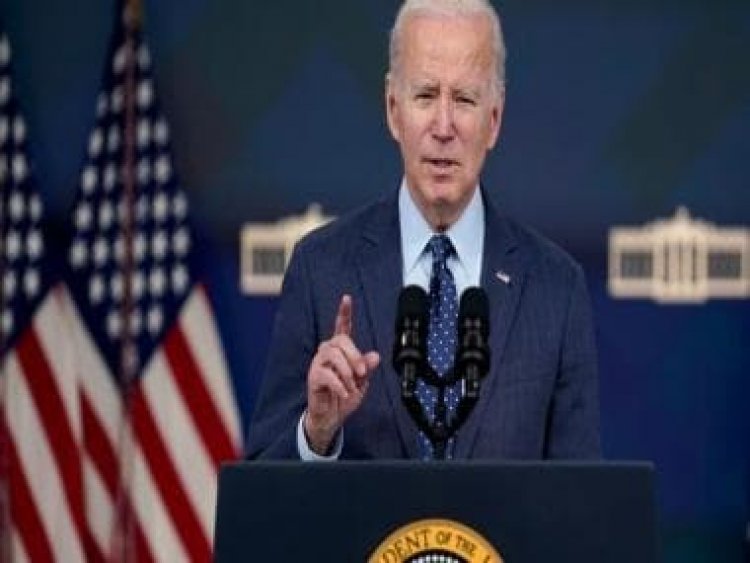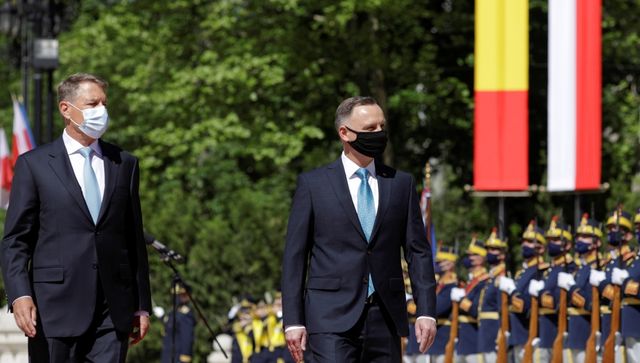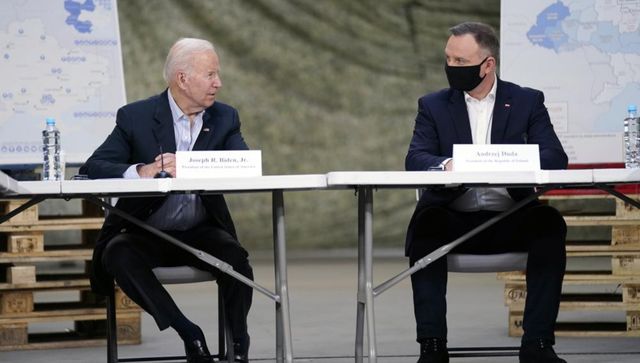Joe Biden to meet Bucharest Nine leaders during Poland visit: What is this group?
Joe Biden to meet Bucharest Nine leaders during Poland visit: What is this group?

As Russia’s war in Ukraine completes a year this month, United States president Joe Biden will travel to Poland to rally allies supporting Kyiv’s defenses.
During his visit, scheduled for 20-22 February, Biden will meet his Polish counterpart Andrzej Duda to discuss “bilateral cooperation as well as our collective efforts to support Ukraine and bolster NATO’s deterrence”, the White House said in a statement earlier.
The US president will also meet the leaders of Bucharest Nine or B9 and express America’s “unwavering support for the security” of the group, the statement added.
Who are the Bucharest Nine and why was the alliance formed? Why Biden’s Poland visit is significant? Let’s understand.
Meet the B9 countries
The Bucharest Nine or B9 group consists of countries located on North Atlantic Treaty Organization’s (NATO) easternmost flank.
These nine Eastern European nations include Bulgaria, the Czech Republic, Estonia, Hungary, Latvia, Lithuania, Poland, Romania and Slovakia.
The Baltic republics of Estonia, Latvia and Lithuania were part of the erstwhile Soviet Union.
The other B9 nations such as Bulgaria, Hungary, Poland, Romania and former Czechoslovakia (Slovakia and the Czech Republic now) were signatories of the now-dissolved Warsaw Pact military alliance.
All these B9 countries are members of the European Union (EU) and the NATO.
Why was it formed?
Founded on 4 November 2015 in the Romanian capital, Bucharest, the alliance was the initiative of Romania’s president Klaus Iohannis and his Polish counterpart Andrzej Duda.

A release from the office of the Romanian President said in 2018, “the Bucharest Format (B9) offers a platform for deepening the dialogue and consultation among the participant allied states, in order to articulate their specific contribution to the ongoing processes across the North-Atlantic Alliance, in total compliance with the principles of solidarity and indivisibility of the security of the NATO Member States.”
As per Sergiy Gerasymchuk, deputy chairman of the Foreign Policy Council Ukrainian Prism, Russia’s invasion and annexation of Ukraine’s Crimea in 2014 and its “support for separatists” in the Donbas region were some major factors behind the formation of the B9 group.
Gerasymchuk wrote in the paper Bucharest Nine: Looking for Cooperation on NATO’s Eastern Flank?, “Sensing the menace emanating from the Russian Federation and having the negative historical experience of interaction with Moscow, albeit being under the NATO umbrella, the states of the BalticBlack Sea region realised that it was necessary to form a regional alliance of like-minded countries on NATO’s eastern flank and took appropriate political steps. Additionally, the countries sharing borders with Russia on land or in the sea (the Baltic countries, Poland, Romania and Bulgaria) officially requested Allied military presence in their territory, while the Czech Republic, Hungary and Slovakia set an example of political solidarity and support.”
The other factor that brings these countries together is their aim to ramp up defence spending to 2 per cent of GDP, Gerasymchuk said.
ALSO READ: Will Russia’s war with Ukraine push 141 million people into ‘extreme poverty’?
Opposition to Russia’s ‘aggression’
These B9 countries have repeatedly criticised Russia’s aggression against Ukraine and have called the annexation of Crimea “unacceptable”.
In 2021, at a virtual summit of the B9, Romania president Iohannis said, “As allies on the Eastern flank, we need to continue consolidating deterrence and defence. We all recently witnessed the worrying military build-up by Russia in our close neighbourhood, in the Black Sea, in and around Ukraine… This is why I have argued, including in discussions with President Biden, for an increase of allied military presence in Romania and…the south of the Eastern flank”, reported Indian Express.
After Moscow invaded Ukraine on 24 February 2022, the B9 leaders held a meeting in Warsaw, which was also attended by Ursula von der Leyen, president of the European Commission.
Voice of America (VOA) noted that the B9 countries, which are more exposed to the “Russian threat”, have pushed for a more robust military response against Russia as compared to other European nations.
Significance of Biden’s visit to Poland
During his Poland visit, Biden will deliver remarks ahead of the one-year anniversary of Russia’s invasion of Ukraine.
Karine Jean-Pierre, White House press secretary, said that the US president will underscore how America rallied the “world to support the people of Ukraine as they defend their freedom and democracy”. He will also reiterate the US commitment to stand with Ukraine “for as long as it takes”, Associated Press (AP) reported.
“He wants to talk about the importance of the international community’s resolve and unity in supporting Ukraine for now going on a year,” John Kirby, the strategic communications coordinator at the National Security Council, said, as per CNN.
Biden’s visit will coincide with Russian president Vladimir Putin’s State of the Nation Address on 21 February.
As per CNN, Biden’s aides have been planning for weeks on how to mark the one-year anniversary of Russia’s war.
Moscow is expected to launch a new offensive in spring, which has prompted Ukrainian president Volodymyr Zelenskyy to urge Western governments for additional assistance and weapons to help in the fight.
As per VOA, it is not clear if Biden would announce another security package or arsenal for Ukraine.
George Beebe, director of Grand Strategy at the Quincy Institute, told VOA, “The US wants Ukraine to make battlefield progress rapidly without dragging NATO into a direct military confrontation with Moscow”.

Biden had visited Poland last March, weeks after Russia’s war began. In his speech at Warsaw’s iconic Royal Castle, the US president had said that Putin “cannot remain in power”.
Meanwhile, German Chancellor Olaf Scholz is also slated to visit the US and meet Biden on 3 March. The two leaders will discuss “ongoing efforts to support Ukraine, impose costs on Russia through sanctions and export controls, and strengthen transatlantic security”, the White House press secretary said on 16 February.
With inputs from agencies
Read all the Latest News, Trending News, Cricket News, Bollywood News,
India News and Entertainment News here. Follow us on Facebook, Twitter and Instagram.
What's Your Reaction?


























































